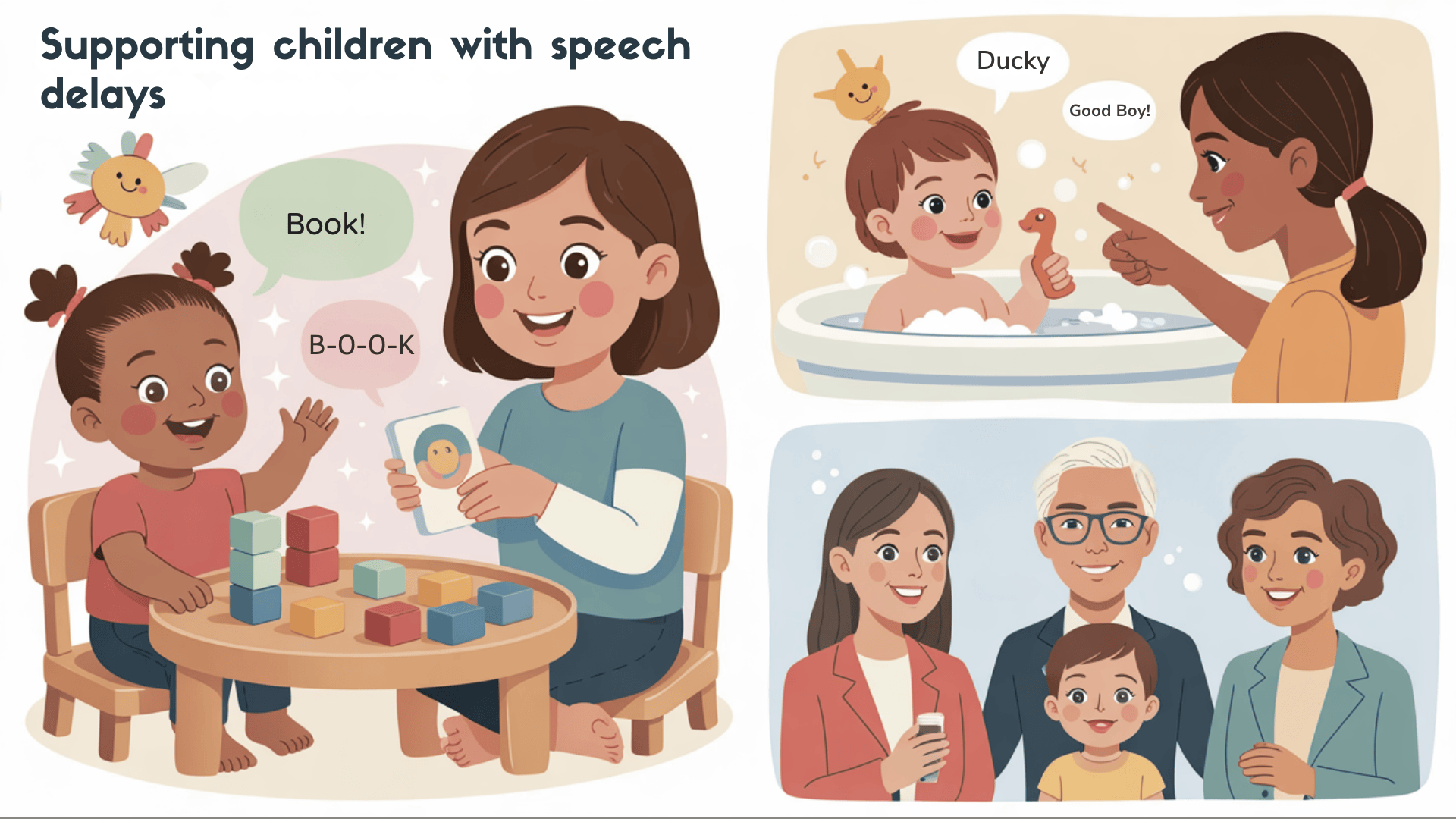Did I Cause My Child’s Speech Delay? Here’s What Matters

“Did I cause my child’s speech delay?” This question weighs heavily on the hearts of parents everywhere. Maybe you’ve noticed your toddler isn’t talking as much as their playmates, or your preschooler’s words are hard to understand.
The worry creeps in, followed by that familiar voice of self-doubt. If you’re reading this, you might be feeling that same weight of concern and guilt.
I want you to know that most speech delays happen for reasons completely beyond your control.
In this blog, you will find many factors that can affect speech development, learn to recognize warning signs, and understand how professional support can help your child thrive.
What Is Speech Delay?
Speech delay occurs when a child doesn’t develop speech and language skills at the expected pace for their age.
Every child grows at their own rate, but there are general milestones that help us identify when extra support might be needed.
By 12 months, most children say their first words. By age two, they typically have 50 words and start combining them into simple phrases. Three-year-olds usually speak in sentences that others can understand most of the time.
Early detection makes a real difference in outcomes. The earlier we identify and address speech delays, the better we can support your child’s communication development.
This is why paying attention to these milestones matters so much.
Parental Influence: What Really Matters
Let me be clear about something important: talking to your child, reading together, and engaging in conversation absolutely support healthy speech development. These activities give children the language input they need to learn.
However, most speech delays occur due to biological, medical, or developmental factors that parents cannot control or prevent. Even children whose parents do everything “right” can experience speech delays.
Your role as a parent is to provide loving support and seek help when needed. You cannot cause most types of speech delays, but you can certainly help your child by getting an appropriate evaluation and intervention.
Common Causes of Speech Delay

Understanding the various factors that can affect speech development helps put your mind at ease. Most causes are medical or developmental conditions that happen naturally, not because of anything you did as a parent.
1. Oral Impairments and Motor Issues
Sometimes, physical challenges make it hard for children to form sounds and words. Problems with the tongue, roof of the mouth, or coordination of lips and jaw can limit speech production.
These are physical differences that some children are born with, not caused by parenting choices.
2. Hearing Problems
Hearing clearly is crucial for learning to speak. Children with hearing loss or frequent ear infections may struggle to hear the sounds they need to copy. Even temporary hearing loss from fluid in the ears can impact speech development during critical learning periods.
3. Developmental and Neurological Factors
Some speech delays are linked to broader developmental differences like autism spectrum disorder, where language develops at its own pace.
Neurological conditions like cerebral palsy or brain injuries can also affect the speech and language areas of the brain. These are medical conditions that happen regardless of parenting style.
4. Intellectual Disabilities
When children have global developmental delays or learning disabilities, speech development often happens more slowly, too.
This affects how they process and understand language, which naturally impacts expression. With the right support, these children can still make meaningful progress in communication.
5. Environmental and Social Factors
While the language environment does matter for development, most speech delays aren’t caused by parenting. Children need to hear talking, singing, and reading to build language skills. However, even children in language-rich environments can have speech delays due to other factors.
6. Other Medical and Genetic Factors
Premature birth, genetic conditions, or pregnancy complications can sometimes affect speech development. Some children are born with a genetic predisposition to speech delays. Being raised bilingual doesn’t cause delays; it’s actually a strength, though it may affect milestone timing.
Signs and Symptoms of Speech Delay

| Age Group | Warning Signs to Watch For |
|---|---|
| 12 Months | Not responding to their name, no pointing or gesturing, no attempts at first words |
| 18 Months | Fewer than 20 words, difficulty following simple instructions, limited social interaction |
| 2 Years | Fewer than 50 words, not combining words into phrases, speech very hard to understand |
| 3 Years | Limited vocabulary for age, unclear speech most of the time, difficulty with simple conversations |
| Any Age | Losing words they once used, not interested in communicating with others |
Trust your instincts – you know your child best. Remember that some children are naturally quieter or take longer to warm up in social situations. But if you have concerns, it’s always better to seek evaluation sooner rather than later.
Diagnosis and Evaluation
Getting a professional evaluation can feel overwhelming, but understanding what to expect helps ease your worries. The process is designed to be child-friendly and thorough.
- Speech-Language Pathologist Assessment: Specially trained professionals evaluate your child’s communication skills using standardized tests and observation during play and interaction
- Milestone Comparison: Your child’s development is compared to typical speech and language milestones for their age group
- Hearing Tests: Comprehensive hearing evaluations rule out hearing problems, since clear hearing is essential for speech development
- Medical Examinations: Additional medical tests may be needed to check for physical causes or underlying conditions
- Child-Friendly Process: Evaluations use engaging activities and games that most children enjoy, making the experience positive rather than stressful
Treatment and Support

When your child needs extra help with speech development, there are many effective options available. The right combination of professional therapy and family support can make a tremendous difference in your child’s progress.
1. Speech Therapy Approach
Speech therapy uses play-based activities and exercises to help children build their communication skills naturally.
Therapists work on everything from making sounds and forming words to understanding language and developing social communication.
Sessions are designed to be fun and engaging, using toys, games, and activities that match your child’s interests. The goal is to make learning to communicate feel like play rather than work.
2. Parent Involvement and Home Support
Your involvement in therapy makes a huge difference in your child’s progress and success.
Therapists will teach you specific strategies to support your child’s speech development at home through everyday activities like meals, bath time, and play.
You’ll learn how to create natural learning opportunities throughout your daily routine, making every interaction a chance to practice communication skills.
3. Team-Based Care
Sometimes children need support from other specialists too, like audiologists for hearing concerns or neurologists for specific medical conditions.
This team approach ensures that your child receives comprehensive care, addressing all aspects of their development and health.
Regular communication between all team members helps coordinate treatment plans and ensures everyone is working toward the same goals.
Conclusion
I want to end where we started, with reassurance for your worried heart. After fifteen years of working with families, I can tell you with confidence that loving, concerned parents like you are not the cause of their child’s speech delay.
You care enough to seek information and help, which shows your dedication to your child’s well-being.
Most speech delays stem from factors completely outside your control: medical conditions, hearing issues, or developmental differences that no amount of perfect parenting could prevent.
Your job isn’t to blame yourself, but to be your child’s advocate and biggest cheerleader.
If you have concerns about your child’s speech development, please consult a speech-language pathologist for an evaluation.
Frequently Asked Questions
Can Parents Cause Speech Delay?
Most speech delays are not caused by parenting. While language input matters, biological and medical factors are usually responsible for delays.
What Can I Do at Home?
Talk to your child throughout the day, read together, sing songs, and follow their interests during play. Respond to their attempts to communicate, even if their words aren’t clear.
When Should I Seek Professional Advice?
As soon as you have concerns. Early intervention services are available even for very young children, and getting help early leads to better outcomes.






